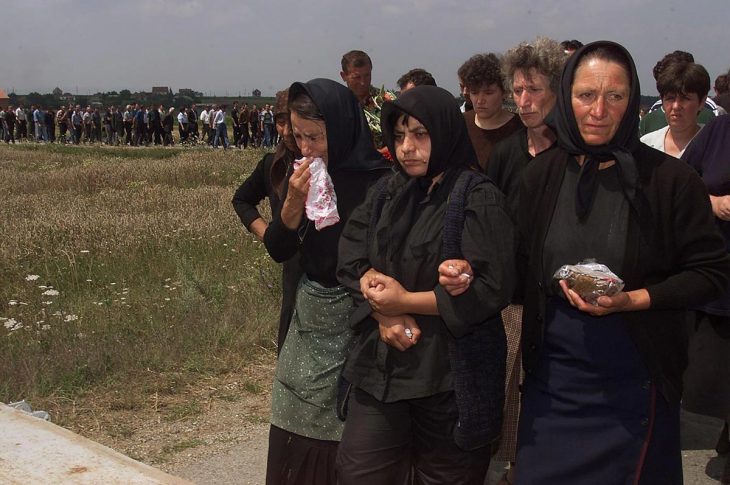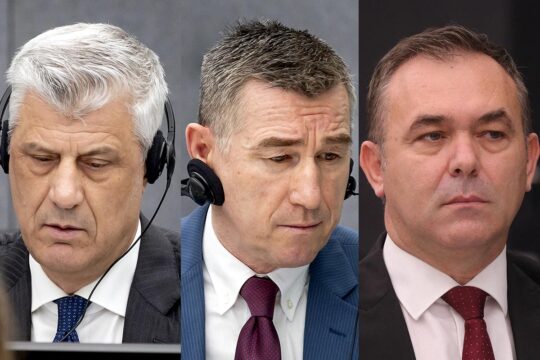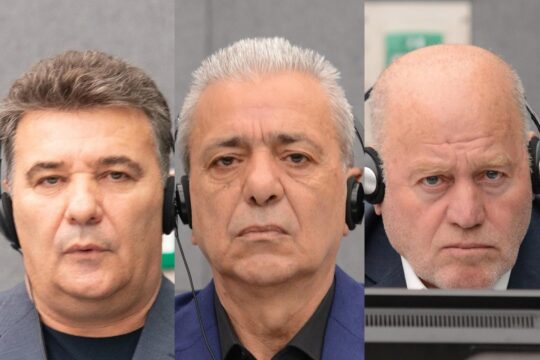A new building in The Hague, a new head of investigations for the prosecution and a string of interviews with potential suspects: the Kosovo Specialist Chambers would seem to be gearing up to start issuing indictments against former key figures of the Kosovo Liberation Army (KLA). While victims seem to be losing hope.
The Kosovo Specialist Chamber was established in 2015. Its creation was a direct result of a 2011 report by Council of Europe rapporteur Dick Marty which tied top former KLA officials, including the current president of Kosovo Hashim Thaci, to atrocities committed against Serbs or those thought to be working with Serbs during and in the aftermath of the 1998-99 conflict in Kosovo.
While such crimes fell under the remit of the International Criminal Tribunal for the former Yugoslavia (ICTY), that institution was winding down and was no longer opening new cases. It was thought that if these allegations were ever going to be brought to justice it would have to be before a new special court.
A strongly disputed tribunal
The Kosovo Specialist Chambers is an unusual set-up. It operates under Kosovo law but it is staffed with international judges and prosecutors. A temporary institution, it is funded by the European Union which both Serbia and Kosovo hope to join. It has jurisdiction over only certain “grave trans-boundary and international crimes” committed during and in the aftermath of the 1998-99 Kosovo conflict, such as described by the 2011 Council of Europe report. The tribunal was set up in The Hague to ensure that witnesses could be well protected ; past trials of KLA top figures, both before the ICTY and by the European Union rule of law mission in Kosovo (EULEX), were indeed marred by reports of witness intimidation.
The Kosovo authorities, a number of whom are themselves former key figures within the KLA and potential suspects, are openly critical of the need for the court. And there is much resistance in the country towards a special court for KLA crimes. The KLA is seen as a liberators’ army that freed the country from Serb oppressors twenty years ago. The Specialist Chamber was therefore established under immense pressure from the E.U. and the United States. Kosovo lawmakers had to change the country’s Constitution to establish the court. But they have since tried twice to repeal that law, insisting that the tribunal is discriminatory against former Kosovo Albanian guerilla fighters.
And so there was some excitement earlier this year when prosecutors called on a host of potential suspects to come and be interviewed. One Kosovo organization which represents war veterans said some 40 people were called in for interviews as witnesses, suspects or both. This prompted speculation that indictments were imminent. President Thaci called on his former war comrades to go to The Hague to show “that the freedom fighters of Kosovo are not shaken by any stigmatizing claims”. Current Prime Minister Ramush Haradinaj – himself tried and acquitted of war crimes and crimes against humanity before the ICTY – promised the support of the government, including legal assistance, to the “freedom fighters”. He stressed that “the struggle of the KLA has been pure and sacred and that will be proven”.
Vulnerable witnesses
In The Hague the Office of the prosecutor insisted these interviews were business as usual. However, with all the institutions of the court and the rules and regulations in place and now a finished headquarters with a custom-built courtroom, there seems to be little that stands in the way of the first indictments. The prosecution has now hired veteran international prosecutor Alex Whiting who has worked on Kosovo cases at the ICTY and coordinated investigations and prosecutions at the International Criminal Court. Observers expect some announcement from the prosecutor by the end of this year.
Yet, as the court is being closely watched in both Belgrade and Pristina, prosecutor Jack Smith seems to keep doing things carefully, step by step. His office will only say it has the right to summon witnesses and potential suspects for interviews, without saying anything about who is interviewed and why. The court has measures in place to protect the identities of witnesses but it is still likely to be difficult to get people to testify. Many will not want to stand up against KLA fighters who are still seen as homeland heroes. And Kosovo is such a very tight-knit society that it will certainly raise eyebrows if a neighbor takes a two-week trip abroad right around the time the tribunal is hearing witnesses in The Hague.
Delays in preparing indictments
Court insiders warn that preparing an indictment before the Kosovo Specialist Chamber will be different that preparing a case in other international courts. For one this court has to adhere to the European Human Rights Convention, which means it cannot just issue indictments for potential suspects and then keep them in custody for years to prepare the trial. Prosecutors will have to provide the entire case against a suspect and disclose all the potentially exculpatory evidence to the defendant almost from the beginning.
Former prosecutor David Schwendiman said in 2018 that his office had amassed over 700,000 pages of documents, 6,000 videos, transcripts and other potential evidence. All this material had to be reviewed and must be available in the court’s three official languages: Albanian, Serbian and English. To prepare cases may take a long time and may explain why the prosecutor has not yet issued any indictment despite the fact that rules and procedures have been in place for two years.
Critics stress that the court had the work of the Special Investigative Task Force, set up after the Marty report came out in 2011, to back on. They consider that investigations into the alleged crimes have, in fact, been ongoing for eight years. In 2014 the prosecutor at the helm of the Task Force already said he was “in a position to file an indictment against certain senior officials of the Kosovo Liberation Army”. Late 2017 Schwendiman also gave the impression that he was ready to issue indictments when he was suddenly replaced early 2018 because of new rules in the U.S. foreign office which had appointed him. His successor Jack Smith has needed time to get acquainted with the information – which meant additional delays.
For the victims, the long wait has taken its toll. Milorad Trifunović, a Kosovo Serb from the Association of Missing Persons whose brother went missing in 1998, doubts the Kosovo Specialist Chambers can properly function in the current political situation. “It all depends on the will of politicians,” he said. “Crimes should not be forgotten or neglected,” Trifunovich insisted but he was not optimistic. “We doubt everything now. We lost confidence and we doubt in everyone.”






